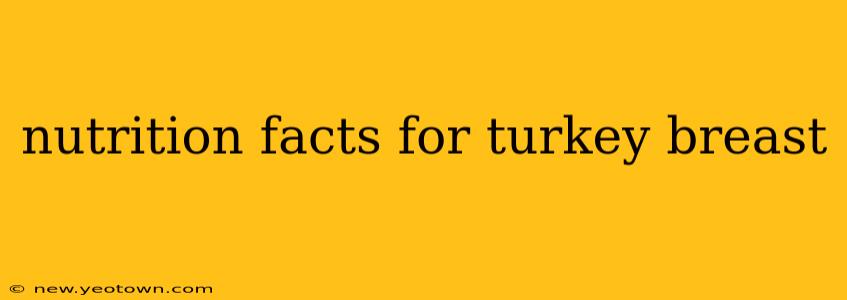Turkey breast. The lean, often-celebrated star of Thanksgiving, but also a versatile protein packed with goodness that deserves a closer look beyond the holiday table. Let's journey into the nutritional heart of this delicious and healthy meat, uncovering the facts and dispelling some common myths.
My name is Anya Petrova, and I've spent years researching nutrition and healthy eating. I'm passionate about helping people make informed food choices, and today, we'll delve into the world of turkey breast nutrition.
What are the key nutritional benefits of turkey breast?
Turkey breast is a lean protein source, meaning it's low in fat and high in protein. This makes it an excellent choice for anyone looking to manage their weight or build muscle. But it's more than just protein; it's a treasure trove of essential nutrients. We're talking about vitamins like niacin (crucial for energy production) and B6 (important for brain development and function). It also boasts minerals like selenium (a powerful antioxidant) and phosphorus (essential for bone health).
How many calories are in a serving of turkey breast?
The calorie count in turkey breast varies depending on the serving size and preparation method. A 3-ounce serving of cooked, skinless turkey breast typically contains around 120-150 calories. However, adding sauces, breading, or cooking methods high in fat can significantly increase the calorie count. Always opt for simple preparation methods to keep your calorie intake in check.
How much protein is in turkey breast?
Protein is the star of the show in turkey breast. That same 3-ounce serving boasts approximately 25-30 grams of protein – a significant contribution to your daily protein needs. This high protein content makes turkey breast a fantastic choice for muscle building, repair, and overall satiety. It keeps you feeling full and satisfied, which aids in weight management.
Is turkey breast a good source of fat?
While turkey breast is considered lean, it does contain some fat. However, the type of fat is predominantly unsaturated, which is considered "good" fat. This type of fat is crucial for heart health and various bodily functions. Remember, completely fat-free diets aren't healthy – a balanced approach is key.
What are the vitamins and minerals in turkey breast?
As mentioned earlier, turkey breast is a nutritional powerhouse beyond just protein. It’s a good source of several vitamins and minerals, including:
- Niacin (B3): Essential for energy metabolism.
- Vitamin B6: Supports brain development and function.
- Selenium: A powerful antioxidant protecting cells from damage.
- Phosphorus: Crucial for strong bones and teeth.
- Potassium: Important for maintaining healthy blood pressure.
What are some healthy ways to prepare turkey breast?
Preparing turkey breast doesn't have to be boring! Here are a few healthy ways to enjoy this lean protein:
- Grilling or Broiling: These methods minimize added fats.
- Baking: Season with herbs and spices for extra flavor.
- Poaching: A gentle cooking method that preserves nutrients.
- Adding to Salads: Slice it and add it to your favorite salad for a protein boost.
- Stir-fries: A quick and easy way to incorporate it into a flavorful meal.
How does turkey breast compare to chicken breast in terms of nutrition?
Both turkey breast and chicken breast are excellent lean protein sources. However, turkey breast often has a slightly higher selenium content. Ultimately, both are healthy choices; the best option often depends on personal preference and dietary needs.
By understanding the nutritional profile of turkey breast, you can confidently incorporate it into your diet as a healthy and delicious part of a balanced lifestyle. Remember, moderation and variety are key to a nutritious and fulfilling diet. Enjoy!

